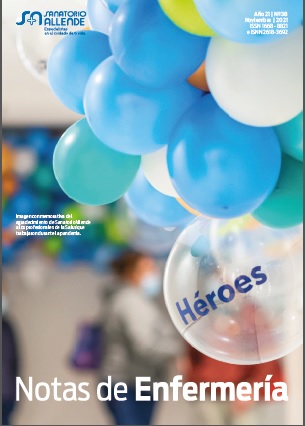Mobile dependence and substance use in nursing students
DOI:
https://doi.org/10.59843/2618-3692.v21.n38.35408Keywords:
addiction, mobile dependence, nursingAbstract
Introduction: smartphone use has been significantly associated with a decline in learning and work-related tasks, including those tasks associated with the healthcare environment. In Mexico, the use of mobile devices has increased exponentially, and it has been estimated that up to 75% of those surveyed have some degree of attention to these devices. Likewise, dependence on these devices has been associated with addiction to substances such as alcohol, tobacco, marijuana, among others. In the socio-sanitary field, it can affect mental performance, concentration in the realization of care and in general for nursing students present distractions in practice. Objective. Identify the level of dependence on the mobile phone and relate it to risk behaviors such as addiction to legal and illegal substances. Methodology. Descriptive, cross-sectional, and observational study. Results. 84.3% state that someone close to them has called them dependent on the mobile phone, 74% were in medium dependence and 22.3% in high dependence, associations were found through Rho and OR, with the consumption of alcohol,
tobacco, and other drugs. Conclusion. Mobile phone dependence in students was generally characterized as a medium and high level and positive correlations were found for tobacco and other drug use.
Downloads
References
1. Perlow L. Predictable Time Off: The Team Solution To Overcoming Constant Work Connection. [Online].;
2012 [cited 2019 diciembre 12. Available from: https://bit.ly/2T9YpNl.
2. OMS. Management of substance abuse. [Online].; 2019 [cited 2019 11 01. Available from: https://www.who.
int/substance_abuse/terminology/definition1/en/.
3. Gutiérrez L, Márquez V, Aguilera G. Adaptation and Validation of the Spanish Version of the Nomophobia
Questionnaire in Nursing Studies. CIN: Computers, Informatics, Nursing. 2016 Octubre; 24(10).
4. Terán A. Ciberadicciones. Adiccipon a las nuevas tecnologías (NTIC). In Congreso de Actualización Pediatría;
2019; Madrid. p. 12.
5. Secretaría de Comunicaciones y Transportes. En México hay 74.3 millones de usuarios de internet y 18.3
millones de hogares con conexión a este servicio: ENDUTIH 2018. [Online]. México; 2019 [cited 2019 11 01.
Available from: https://bit.ly/2C5BSFz.
6. Islas O. Cifras sobre jóvenes y redes sociales en México. Entretextos. 2015 abril-julio; 7(19).
7. Leep A, Li J, Barkley J, Salehi S. Exploring the relationships between college students’ cell phone use, personality
and leisure. Computers in Human Behavior. 2015; 43: p. 2010-2019.
8. Gill P, Jamath A, Gill T. Distraction: an assessment of smartphone usage in health care work settings. Risk
Management and Healthcare Policy. 2012; 5: p. 105-114.
9. McBride D. Distraction of clinicians by smartphones in hospitals: a concept analysis. JAN: CONCEPT
ANALYSIS. 2015 Febrero; 7(9).
10. Cho S, Lee E. Development of a Brief Instrument to measure Smartohone Addiction Among Nursing Students.
CIN: Computers, Informatics, Nursing. 2015 Mayo; 33(5).
11. Paredes M, Ríos R. Relación de dependencia al móvil e inteligencia emocional en estudiantes universitarios
de la carrera de psicología de una universidad privada de Cajamarca. Tesis. Lima: Universidad Privada del
Norte, Facultad de Ciencias de la Salud; 2017.
12. Sánchez X. Dependencia al móvil en estudiantes de psicología de una Universidad de Lima. Tesis de Especialidad.
Lima: Universidad Nacional Federico Villareal, Facultad de Psicologia; 2019.
13. Chumacero A. Dependencia al celular entre los y las estudiantes de la Facultad de Educación de la Universidad
de Chiclayo. Tesis de grado. Pimentel, Perú: Universidad Señor de Sipán, Facultad de Humanidades; 2017.
14. Ticona Y, Tupac E. Características del uso y dependencia el móvil en estudiantes de enfermería. Tesis de
grado. Arequipa, Perú: Universidad Nacional de San Agustin, Facultad de Enfermería; 2016.
15. Mamani E. Nivel de dependencia al teléfono inteligente en estudiantes de la Facultad de Enfermería. Tesis
de grado. Puno, Perú: Universidad Nacional del Altiplano Puno, Facultad de Enfermería; 2017.
16. Tresáncoras A, García C, Piqueras J. Relación del uso problemático del Whatsapp con la personalidad y la
ansiedad en adolescentes. Salud y drogas. 2017 diciembre; 17(1): p. 27-36.
Downloads
Published
Issue
Section
License
Copyright (c) 2021 Sanatorio Allende

This work is licensed under a Creative Commons Attribution-NonCommercial 4.0 International License.
Those authors who have published with this journal, accept the following terms:
- Attribution — You must give appropriate credit, provide a link to the license, and indicate if changes were made. You may do so in any reasonable manner, but not in any way that suggests the licensor endorses you or your use.
- NonCommercial — You may not use the material for commercial purposes.

